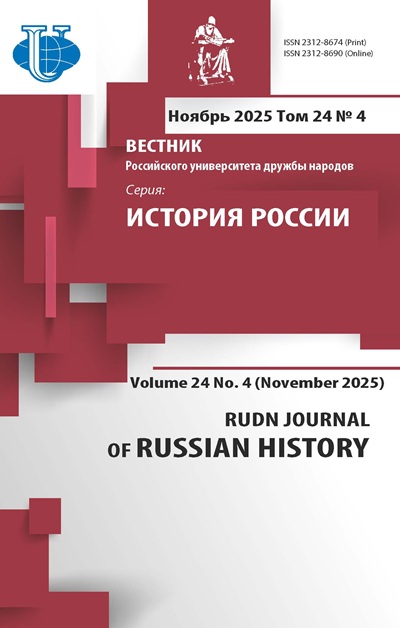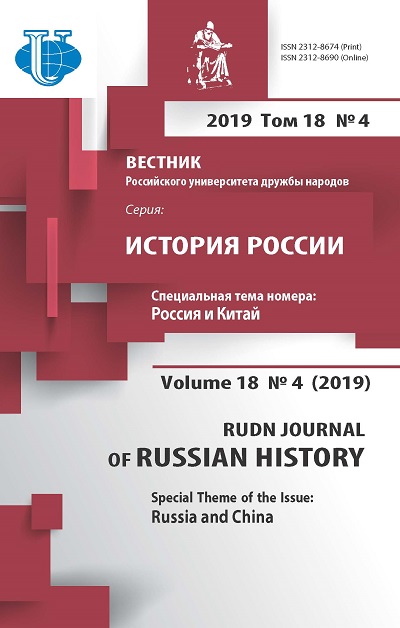Внешняя политика России: от «нового мышления» до многовекторности
- Авторы: Сидорова Н.П.1
-
Учреждения:
- Институт актуальных международных проблем Дипломатической академии МИД России
- Выпуск: Том 18, № 4 (2019): РОССИЯ И КИТАЙ
- Страницы: 985-1001
- Раздел: СТАТЬИ
- URL: https://journals.rudn.ru/russian-history/article/view/22317
- DOI: https://doi.org/10.22363/2312-8674-2019-18-4-985-1001
- ID: 22317
Цитировать
Полный текст
Аннотация
В данной статье предпринимается попытка проанализировать внутренние и внешние причины эволюции российской внешней политики на протяжении всего постсоветского периода, ее нынешние приоритеты, определить вызовы, с которыми России предстоит иметь дело в обозримой перспективе. Показано, как под влиянием «нового мышления» М.С. Горбачева закончилась холодная война. Проанализирована первоначальная прозападная стратегия российского руководства после распада СССР, изложены факторы, приведшие к демонтажу этой стратегии и перезагрузке внешнеполитического курса России в конце 1990-х - начале 2000 -х годов. Рассмотрены основные векторы внешней политики Москвы на современном этапе, дан прогноз развития международных отношений. Автор приходит к выводу, что Россия вновь делает упор на безопасность, сильные вооруженные силы и налаживание стратегического партнерства в различных регионах. Защита национальных интересов находит свое выражение в защите русской диаспоры, прославлении исторических достижений России и противодействии попыткам извратить прошлое. Россия стремится играть ключевую роль на постсоветском пространстве, демонстрируя российский флаг на всех четырех континентах. Идеология больше не влияет на отношения Кремля с другими государствами, а экономические интересы побуждают Москву восстановить сотрудничество со многими странами третьего мира. Можно ожидать, что Россия будет продолжать конкурировать с Западом в постсоветских республиках и в области контроля над вооружениями, одновременно продвигая партнерские отношения с Китаем и другими незападными субъектами. Однако многовекторный курс сохранится.
Об авторах
Надежда Павловна Сидорова
Институт актуальных международных проблем Дипломатической академии МИД России
Автор, ответственный за переписку.
Email: nadsidorova@mail.ru
кандидат политических наук, ведущий научный сотрудник Института актуальных международных проблем Дипломатической академии МИД России
119021, Россия, г. Москва, Остоженка 53/2, стр. 1Список литературы
- Антонов А. Контроль над вооружениями: история, состояние, перспективы. М.: РОССПЭН, 2012. 245 с.
- Бажанов Е.П. Актуальные проблемы международных отношений. Т. 1. М.: Научная книга, 2001. 464 с.
- Бажанов Е.П. Китай: от Срединной империи до сверхдержавы XXI века. М.: Известия, 2007. 350 с.
- Бажанов Е.П. Современный мир. М.: Известия, 2004. 424 с.
- Бажанов Е.П., Ли В.Ф., Федотов В.П. Проблемы обеспечения безопасности в Азиатско-Тихоокеанском регионе. М.: Научная книга, 1999. 228 с.
- Бажанов Е.П., Бажанова Н.Е. Многополюсный мир. М.: Восток-Запад, 2010. 464 с.
- Бажанов Е.П., Бажанова Н.Е. Международные отношения в XXI веке. М.: Восток-Запад, 2011. 116 с.
- Бажанов Е.П., Бажанова Н.Е. Диалог и столкновение цивилизаций. М.: Весь мир, 2013. 270 с.
- Бажанов Е.П., Бажанова Н.Е. Мир и война. М.: Восток-Запад, 2011. 464 с.
- Бажанов Е.П. Америка: вчера и сегодня. М.: Известия, 2005. 574 с.
- Бажанова Н.Е. Между мертвыми догмами и практическими потребностями. Внешнеэкономические отношения Северной Кореи, 1945-1990. Сеул: Издательство «Хангук кёнчже ильбо», 1992. 321 с.
- Бажанова Н.Е. Внешнеэкономические связи КНДР. В поисках выхода из тупика. М.: Наука, Восточная литература, 1993. 213 с.
- Билахари Каусикан. Конец холодной войны // Международная жизнь. 2016. № 2. С. 28-40.
- Горбачев М. Жизнь и реформы. М.: Новости, 1995. 656 с.
- Громыко А.А. Человек, дипломат, политик. М.: Восток-Запад, 2010. 184 с.
- Дементьев В., Суриков А. Армия, реформа, безопасность. М.: Институт оборонных исследований, 1996. 207 с.
- Никифоров К.В. Революции и реформы в странах Центральной и Юго-Восточной Европы: 20 лет спустя. М.: РОССПЭН, 2011. 776 с.
- Карпович О.Г., Ногмов А.М., Шангараев Р.Н. Политика России и СШАвобласти противодействия международному терроризму. М.: Дипломатическая академия, Институт актуальных международных проблем, 2019. 165 с
- Карпович О.Г., Сидорова Н.П. Проблемы взаимодействия в свете реформирования миграционной политики (от опыта ЕС к ЕАЕС) // Геополитический журнал. 2018. № 1 (21). С. 54-63
- Иванов И.С. Россия и большой Ближний Восток. М.: РСМД, 2013. 64 с.
- Зверева Т.В. Внешняя политика современной Франции. М.: Канон+, 2004. 344 с.
- Сидорова Н.П. Россия - Украина: тернистый путь к гармонизации отношений. М.: Дипломатическая академия, 2000. 170 с.
- Татаринцев В.М. Двусторонние отношения России со странами СНГ. М.: Восток-Запад, 2011. 264 с.
- Торкунов А.В. Современные международные отношения. М: РОССПЭН, 2000. 584 с
- Панов А.Н., Бажанов Е.П., Райков Ю.В. Азиатско-Тихоокеанский регион. М.: Восток-Запад, 2010. 319 с
- Романовский С.К. Дипломатический ежегодник - 1996. М.: Научная книга, 1996. 270 c
- Чубарьян А.О. Советская внешняя политика в ретроспективе: 1917-1991. М.: Наука, 1993. 205 с.
- Flanagan S.J., Schear J.A. Strategic Challenges. America’s Global Security Agenda. Dulles, Virginia: Potomac Books, 2008. 415 p.
- Rozman G., Togo K., Ferguson J. Russian Strategic Thought toward Asia. New York: Palgrave, 2006. 310 p.
- Rosman G. Northeast Asia’s Stunted Regionalism: Bilateral Distrust in the Shadow of Globalization. Cambridge: Cambridge University Press, 2004. 401 p
- Shearman P. Russian Foreign Policy Since 1990. Boulder: Western Press, 1995. 324 p
Дополнительные файлы















